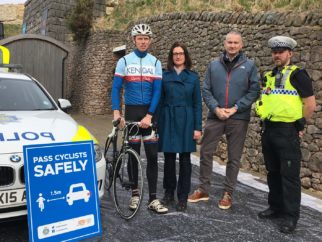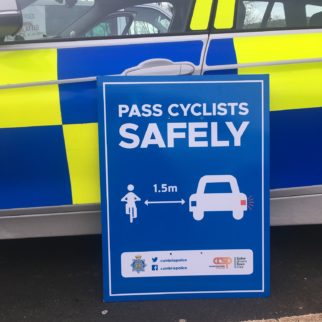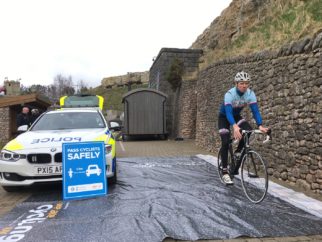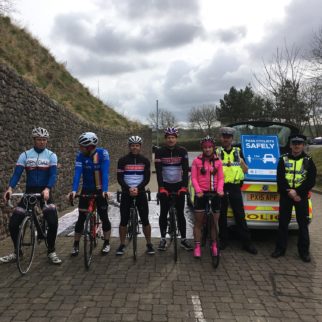Operation Close Pass is an initiative being rolled out by police forces across the UK to reduce the number of accidents caused by drivers not giving enough space to people riding bikes. Today it was the turn of Cumbria Police to introduce the scheme, so I headed up to the launch at Rheged Centre in Penrith to find out more. I was particularly interested for several reasons. Firstly my two Cycle Sprogs and their friends are reaching the age that they want to be out cycling on the roads, and I’m very keen to find out about anything that can make this safer for them. Secondly, I’m a member of Kendal Cycle Club and myself and my friends are out on Cumbria’s rural roads experiencing dangerous close passes every day. Finally, as someone who makes all my everyday, around-town trips by bike or on foot, I’m a huge advocate for getting more people getting out of their cars and embracing active travel. How would Operation Close Pass help these three different parts of my life?

What is Operation Close Pass?
Operation Close Pass was originally launched by West Midlands Police in 2016, and was designed to proactively identify and educate drivers who pass too closely to cyclists. There are several methods employed by the police:
Use of video evidence to identify, educate and prosecute dangerous drivers
Plain clothes police officers with helmet cameras will cycle in traffic and are able to use the video evidence to either educate drivers at the side of the road or, where appropriate, prosecute repeat offenders or those deemed to be dangerous drivers. Video evidence can also be submitted by cyclists (or other road users). The great thing about this is that the police are proactively dealing with dangerous driving before an accident occurs, rather than waiting for someone to be seriously injured or killed.
Road signs to remind drivers about the safe overtaking distance
Cumbria Police have 200 new signs that will be put up around the county to remind drivers to allow a safe passing distance of 1.5 metres when overtaking a cyclist. These will be placed in locations recommended by local cycle clubs, areas where there have been previous accidents, plus on routes as visitors come into the county and the Lake District National Park.

The Cumbrian signs have been designed free of charge by my fellow Kendal Cycle Club committee member Rory Black and his team at Designworks, who felt the signs being used elsewhere in the country weren’t as clear as they could be. The end result is a really simple sign that should be easy for drivers to understand.
Use of Close Pass mats to demonstrate the safe distance for overtaking a cyclist
Following the success of Operation Close Pass by West Midlands Police, a Kickstarter campaign was launched by Cycling UK to raise £12,000 to produce “Close Pass” mats for all UK police forces. These mats are used to show drivers the amount space they need to leave when safely overtaking a cyclist. Here’s the mat being demonstrated by Rory at the Cumbrian Operation Close Pass launch event:

Does Operation Close Pass work?
Evidence from West Midlands police certainly suggests it does, with a 20% reduction in the number of cyclists seriously injured or killed on their roads in the first 12 months after launch. 13 drivers were prosecuted and around 350 others fined and given licence points after officers reviewed helmet- and dash-cam footage provided by members of the public. That’s over 550 dangerous drivers targeted before they ruined someones life, in just one year in one county.
For this reason the initiative is being adopted around the UK, with police forces adapting the techniques to suit the local roads. Here in Cumbria we have so many rural roads of varying widths and speeds, which pose different challenges to those in large urban areas.
What about the sprogs and non-cyclists?
Having spoken to various cyclists, police officers and council officials today, it’s clear that Operation Close Pass is a great way to proactively protect cyclists who ride in traffic. So, from the perspective of protecting myself and my cycle club friends when we’re out on our bikes, it’s a brilliant initiative. We’re all adults, who are confident and fit cyclists, and have decided that the risk of riding on the roads is worth the physical, emotional, financial and other benefits that we enjoy from cycling.
It was interesting that local cycle clubs were chosen to help promote the scheme – today was a demonstration of cycling as a sport, not as a mode of transport.

From the point of view of making cycling safer for my children, and for encouraging non-cyclists to get out of their cars and onto bikes, then Operation Close Pass isn’t the solution. In fact, the road signs are a stark reminder of the risk that you’re taking when cyclists and motorised vehicles share road space.
Whilst viewed as a “rural” county, there are plenty of places in Cumbria where rush hour traffic congestion and air pollution problems exist. There are also 292 Primary Schools, 56 Secondary Schools and 46 schools and colleges for 16-18 year olds in the county, so there’s a huge untapped potential to get more children and young people cycling every day.
I had some interesting discussions today about the priority of cyclists in the funding of Cumbria’s transport infrastructure, and it’s clear that there isn’t the political will to address the challenge of how to get more people (of all ages) cycling as a form of active transport. This would involve investment in safe (i.e. segregated) routes from residential areas to schools and work places, and the willingness to prioritise cycling over other forms of transport (or at least view it as an equally valid way of getting from A to B).
Whilst some areas of the UK (in particular Scotland, London, Manchester, Bristol and Newcastle) are starting to make these priority calls and investment decisions, it’s clearly going to take a while in other parts of the country. In the meantime, I’m thinking of investing in a helmet cam.
Has Operation Close Pass been rolled out in your area yet? What do you do to protect your sprogs whilst cycling? Do let me know in the comments section below.
Other articles you may find interesting:
- Tackling “dangerous” cycling to school
- How to get more children cycling safely to your school
- Windermere Bike Boat to Wray Castle – a family cycling adventure in the Lake District
- Riding the Tour of Britain before school
- Perfect gifts for cyclists of all ages – with love from Kendal
- How we became a mountain biking family in just one year
- The best family films at Kendal Mountain Festival

Comments